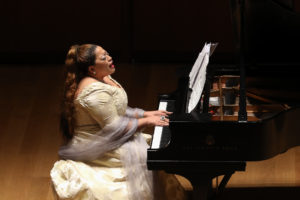
George London Recital Series Review: Michelle Bradley and Will Liverman
Soloists Ring in Holidays with Soulful Recital
By Logan MartellOn Sunday, Dec. 2, 2018, audiences gathered in the Gilder Lehrman Hall of The Morgan Library for a performance from a duo of powerful, young artists. Since its founding, the George London Foundation has developed and supported singers who would go on to the world’s most prominent stages; Sunday’s soloists, baritone Will Liverman and soprano Michelle Bradley, joined by accompanist Ken Noda, showcased skill after skill through the recital, to the great delight of the audience.
Song Cycles & Arias
Liverman’s first set was made of selections from Ralph Vaugh Williams cycle “Songs of Travel.” The first two, “Let Beauty Awake,” and “The Roadside Fire,” gave an early introduction to Liverman’s firmly-rooted baritone; the first number paired his voice with light, sweeping arpeggios from the accompaniment as he made a strong invocation to beauty. The second number saw him utilize his crisp diction to bring out the idyllic language of the text, in phrases such as “I will make you brooches and toys for your delight, of bird-song at morning and star-shine at night…” Towards the end of the last stanza, Liverman’s phrase “That only I remember,” carried a falling melody that was echoed by the accompaniment; though it came a beat later, this did not seem like an issue of synchronization as Liverman and Noda smoothed towards a delicate conclusion.
The last two selections from “Songs of Travel,” were “Wither Must I Wander,” and “Bright Is the Ring of Words.” These numbers demonstrated Liverman’s vocal power and the ease with which he was able to fill the air of the Gilder Lehrman Hall. By the fourth number’s conclusion, I found myself curious to hear if there was a more delicate and affectionate quality to round out the great strength Livermann had been displaying, but more on that later.
Soprano Michelle Bradley took the stage for a charged rendition of “Es gibt ein Reich” from Strauss’ “Ariadne auf Naxos.” Her gorgeous resonance almost instantly filled the air with a presence both arresting and loving. This fullness of sound made it all the more striking when Bradley unleashed a powerful climax in calling the name of Hermes. Through this aria, Bradley displayed her vocal flexibility to weave through her registers, revealing a wealth of colors to draw from. The last stanza of the text saw her use rejoicing tones to conclude with an alluring tenderness well matched by the fluttering accompaniment.
After returning to the stage, Will Liverman sang “Heiterkeit und Frohlichkeit,” from Albert Lortzing’s “Der Wildschutz.” Here, Liverman deftly transitioned between singing and a quality closer to speech as he made his way through the praising imagery of the text. His delivery bore a highly-touched sentiment on his face that betrayed the cooler composure of his body and voice; this heightened emotion poured forth in full as he ended the number with a tremendous finish that brought roaring applause from the audience.
Taking the stage again, Michelle Bradley performed Samuel Barber’s “Hermit Songs,” the content of which spanned from the homely to the Heavenly. The first, “At Saint Patrick’s Purgatory,” began with her showing a classically-beautiful operatic loft from which passion would soon erupt; this came neatly in the middle of the number as Bradley rang out “O King! What shall I do with a heart that seeks only its own ease?” The second number, “Church Bell at Night,” featured sweeping runs in the piano’s higher reaches that were gravely punctuated with low, gritty chords. A brief song, only a few lines long, the pained, lingering in Bradley voices established a heavy atmosphere in preparation for the next number, “St. Ita’s Vision.” Here, Bradley’s delivery emphasized the maternal language of the narrator wanting to nurse the infant Christ, and used expansive climaxes to bestow the proper reverence held within the text.
A more playful contrast came in the seventh song, “The Monk and His Cat.” This song featured caring observations from Bradley, joined by an inelegant, prowling melody from Noda’s accompaniment. The next song, “The Praises of God,” bore declamatory phrases which Bradley treated with a fittingly scolding tone as she reprimanded man for not using his gifts of soul and speech to sing God’s glory. This song was capped off with a series of vocal gymnastics from Bradley, set to the closing line “All day, everywhere laudations sing.”
Holiday Songs
Ending the recital in the spirit of the holidays, Bradley and Liverman’s encores were Christmas classics given personal flair, the accompaniment of which they played themselves. The first encore, Liverman sang “Oh Come, All Ye Faithful.” The clean chords he played in the opening measures were soon met with a jazzy, upwards glissando that took the Christmas atmosphere and moved the celebration from church to a warm, family gathering. Here, Liverman relished in the feelings of mirth and joy, revealing great delicacy that wonderfully served his vocal strength, in phrases such as “Oh come, let us adore him,” and “Glory to God!” The second encore was Bradley singing and playing an arrangement of The Lord’s Prayer. Her accompaniment was jazzy, yet tender, and provided a gentle foundation which Bradley would soar over with her exultant tones.
Bringing things to a conclusion, Bradley and Liverman came together for an a cappella duet of “Silent Night.” They began with Liverman, followed by Bradley, each giving a solo pass through the lyrics, before joining together beautifully. His vocal warmth found great compliment in Bradley’s ornamentations which were fit for any Christmas tree; their joyous, united ending placed a bow upon the present that was Sunday evening’s recital.


